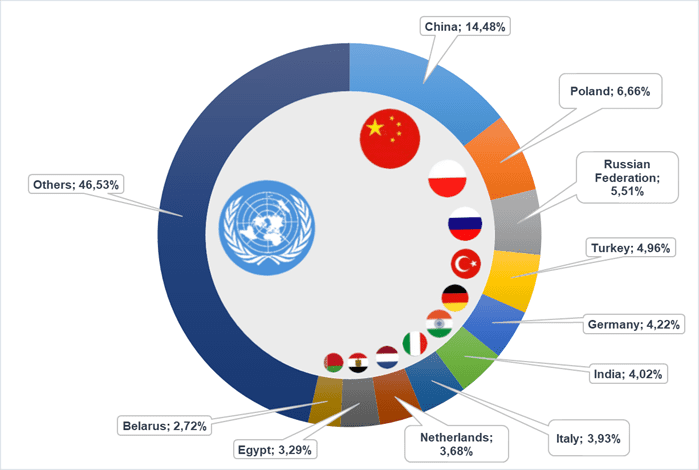Main trade partners of Ukraine in % from total volume (export from Ukraine to other countries) in 2020.

SSC of Ukraine

Allegations of the existence of a crisis of confidence between the leadership of the United States and Ukraine do not correspond to reality, spokesman for the Ministry of Foreign Affairs of Ukraine Oleh Nikolenko said.
“Allegations of the existence of a crisis of confidence between the leadership of the United States and Ukraine do not correspond to reality,” Nikolenko said in response to an inquiry from Yevropeiska Pravda (European Truth).
The speaker supported the recent statements from the US Embassy in Ukraine, where they promised that Joe Biden would call Volodymyr Zelensky soon, noting that the United States did not put forward any prerequisites for such negotiations.
“Earlier, the Ministry of Foreign Affairs of Ukraine, and now the US Embassy in Kyiv, has clearly announced the preparation of a telephone conversation between the leaders of the two countries without any preconditions. There are no grounds to question the strategic nature of the partnership between Ukraine and the United States,” Nikolenko said.
He also accused certain public figures, without calling names, of “inventing contrived stories” about relationship problems. “There is a crisis of public assessments of some Ukrainian figures,” the diplomat said.

At Kyiv Security Forum, organized by Arseniy Yatsenyuk’s Open Ukraine Foundation on Wednesday, some 12 points were presented to strengthen the strategic partnership between the United States and Ukraine.
According to the document, titled “12 Points of Strategic Partnership Between the United States and Ukraine,” the arrival of President of the United States Joseph Biden and the new U.S. Administration offers an opportunity to deepen the strategic partnership and commitment between the United States and Ukraine, as well as advance the interests of both states.
“We, American and Ukrainian politicians and diplomats, former officials, experts and public figures, urge the governments of both countries to develop an ambitious and comprehensive agenda that will deepen our strategic relationship. This agenda should promote mutual interests, contribute to strengthening security and stability in Central and Eastern Europe, promote Ukraine’s further integration into the EU and NATO membership, and outline and prioritize transformative democratic reforms necessary for the full development of Ukraine’s economy and its transatlantic movement progress,” according to a statement.
The officials said in the document that mutual dedication to strengthening democratic values must always remain at the core of the U.S. and Ukrainian relations.
“This implies strengthening democracy and the rule of law, individual freedom, freedom of speech, full independence of the judiciary and anti-corruption institutions, greater transparency and accountability of government actions and open governance, independence of the media and an active civil society. Solidarity and concrete actions to promote these values are needed to strengthening mutual trust, understanding the democratic aspirations of Ukrainians and providing a common basis for cooperation between both countries,” the experts said.
They said the United States and Ukraine must act together to restore Ukraine’s sovereignty and territorial integrity, and contain further Russian aggression.
“This implies expanding our strategic partnership and defense cooperation and the United States seeking new opportunities to increase defense assistance in order to strengthen Ukraine’s ability to deter Russia’s offensive. This means continuing to provide lethal defense assistance and strengthening the Navy. Other areas of possible military cooperation include the development of special operations forces, anti-aircraft and coastal defense,” the officials said in the document.
Its signatories believe that the United States and Ukraine must maintain close dialogue in order to increase the Kremlin’s cost of continued Russian aggression against Ukraine. The United States should also consult closely with Europe on this issue, in particular on strengthening sanctions.
They believe that such negotiations, as well as negotiations with Russia on Ukraine, should be based on the principle “nothing about Ukraine without Ukraine.”
“In consultations with Ukraine and its European partners, the Joseph Biden Administration should explore the possibilities of more active involvement at the highest level by the United States in the negotiation process, which is now being conducted by the German Chancellor and the French President, in order to break the situation and contribute to a real end to the conflict in Donbas , the withdrawal of all Russian and Russian-controlled forces and the restoration of Ukraine’s full sovereignty over Donbas,” the experts said in the document.
The experts also said the United States and Ukraine should also consult on the political, diplomatic and economic steps necessary to bring Crimea back to Ukraine.
“They must work together to ensure international compliance with the principle ‘Crimea is Ukraine’ and maintain the sanctions adopted against Russia for the illegal seizure of the peninsula. We welcome the efforts of the Ukrainian government to create the Crimean Platform as an initiative that will keep the issue of occupied Crimea on the international agenda of the day and remind people, including Russia, that Crimea remains Ukrainian in the eyes of the international community,” according to the document.
In addition, the signatories to the document believe that the United States and Ukraine should consult on steps to strengthen security and stability in the Black Sea region, in particular with the support of NATO and European partners.
“The United States, together with NATO allies, should continue to regularly deploy air, land and sea forces in the region where Russia, Europe, the Middle East, the Balkans and the Caucasus converge,” the experts said.
It also noted that in recent years, the United States and Ukraine have become targets of Russian political intervention, disinformation campaigns and cyber attacks.
“They should exchange their experience and share best practices in combating these and other forms of Russian hybrid warfare,” according to the recommendations.
It is stressed that the Nord Stream 2 pipeline, if completed, would threaten Euro-Atlantic unity and deprive Ukraine of significant transit revenues.
“The United States and Ukraine should consult on how to build and maintain a transatlantic position against the completion of the pipeline, as well as actions that Russia can take against Ukraine to lift the Nord Stream 2 sanctions. At the same time, Ukraine should undertake major reforms to improve energy efficiency and root out corruption in this and other sectors,” the experts said in the statement.
The experts said the United States and Ukraine must work together to advance Ukraine’s NATO integration and Kyiv’s ultimate goal of NATO membership.
“The United States must firmly adhere to NATO’s open door policy and advise Kyiv on how best to prepare for membership, as NATO leaders pledged at the Bucharest summit in 2008. Ukraine must commit to the necessary reforms and practical steps that will lead to its military and other security and defense structures are in line with NATO standards and norms,” according to the document.
It is noted that Ukraine’s membership in NATO will strengthen the North Atlantic Alliance, contribute to the historical unification of Europe and create the preconditions for the transformation of relations with Russia.
Moreover, the renewed U.S.-Ukrainian partnership is associated with the willingness of the Ukrainian authorities to quickly implement transformational democratic reforms and actively act to protect and strengthen the independence of such key institutions as the National Anti-Corruption Bureau (NABU) and others.
“For a strong anti-corruption work, effective reforms of the prosecutor’s office and the judicial system are necessary. Ukraine must also make irreversible the significant reforms already achieved, in particular in the areas of the land market, privatization of state-owned enterprises, the independence of the National Bank of Ukraine, decentralization, transparency of fiscal and budgetary policies in addition to reforms in the gas sector, reforms in the public procurement system and on the transparency of assets and incomes of civil servants and parliamentarians,” the experts said in the document.
In addition, important are steps to remove the excessive influence of oligarchs, establish the rule of law with fair economic norms and practices for large, medium, small and foreign businesses, as well as to strengthen the institutional capacity of the Ukrainian state – all this is crucial for improving the lives of Ukrainian citizens, the experts said.
They said Ukraine should ensure the protection of property rights for all Ukrainian and foreign investors.
“While the Ukrainian authorities should urgently focus on reform, seeing them as urgent tasks, the United States, in coordination with international financial institutions, the European Union and partners from the Group of Seven (G7), should continue to provide support helping Ukraine build a modern democratic an economy fully compatible with the standards and norms of the European Union. In this sense, Copenhagen criteria of the EU form a clear roadmap. Such assistance should directly depend on the implementation of effective reforms,” according to the document.
Among the American signers are Francis Fukuyama; former Deputy Secretary General of NATO Alexander Vershbow; former Ambassadors of the United States to Ukraine John Herbst, Marie Yovanovitch, Steven Pifer, Roman Popadiuk, William Taylor, as well as members of the United States Congress, high-ranked diplomats and well-known experts.
Among the Ukrainian signers are Chairman of the Kyiv Security Forum and Prime Minister of Ukraine in 2014-2016 Arseniy Yatsenyuk; Deputy Chairwoman of the Verkhovna Rada of Ukraine Olena Kondratiuk; Co-chair of Lviv Security Forum and former Deputy Chairwoman of the Verkhovna Rada of Ukraine in 2014-2019 Oksana Syroid; former Secretaries of the National Security and Defense Council of Ukraine Volodymyr Horbulin, Oleksandr Turchunov and Andriy Parubiy; Chairwoman of the Parliamentary Committee on Ukraine’s Integration into the European Union Ivanna Klympush-Tsintsadze; public figures Josef Zissels and Myroslav Marynovych; diplomats Volodymyr Ohryzko, Danylo Lubkivsky, Valeriy Chaly, Kostiantyn Yelisieiev, Volodymyr Vasylenko, Yuri Scherbak, Oleh Shamshur, Oleksandr Motsyk, Volodymyr Handogiy, Roman Bezsmertnyi, as well as members of the Verkhovna Rada of Ukraine from the Servants of the People, European Solidarity, Holos and Batkivschyna factions.
ARSENIY YATSENYUK, KYIV SECURITY FORUM, PARTNERSHIP, UKRAINE, UNITED STATES

Ukraine has registered a Chinese vaccine against COVID-19, CoronaVac made by Sinovac Biotech Ltd, its authorized Ukrainian representative, the Kyiv-based Lekhim told Interfax-Ukraine on Tuesday.
Under its contract with the Health Ministry for 1.9 million doses of the Chinese vaccine, Lekhim is to supply the first 700,000 doses this month.
Lekhim Group and Sinovac Biotech reached the agreement after ten months of talks over cooperation on the distribution and localization of the vaccine production for a five-year period.
Earlier, Ukraine registered the Pfizer and AstraZeneca vaccines.

In 2021, Polish company PCC Intermodal S.A. plans to increase the number of container train connections between Poland and Ukraine from one to three per week, according to the company’s website on the occasion of the first anniversary of the service, which connects several cities in Poland with the Ukrainian station of Mostiska.
“We did the first tests and tried to launch regular services to Ukraine already in 2011. The economical and political situation in Ukraine has stopped this project, until last year. In the spring of 2020, we successfully returned with the project. In the spring time 2020 we have successfully came back with the Ukrainian project! The customers being satisfied while having easy access to the alternative logistics solution, using rail connections, keep us developing the intermodal services to Ukraine. We have already booked the new platforms for this connection and are happy to welcome everyone on board of our regular trains,” the company’s press service said.
Curently, the company offers regular intermodal connections, once a week to/from Mostyska in relation with: to Gdańsk, Gdynia, Central Poland, Upper Silesia, Lower Silesia, Berlin, Hamburg, Duisburg, Rotterdam and Antwerp.
The most common goods transported to/from Ukraine at the moment are: chemical products, polymers, fertillizers, ferroalloys.

The volume of construction work performed in Ukraine in January 2021 decreased 11.2% compared to January 2020, to UAH 7.2 billion, the State Statistics Service has said.
According to the statistics department, in January, the volume of construction work performed decreased by 80.3% compared to the previous month (according to seasonally adjusted data – by 14.6%), while compared to November 2020, this figure decreased by 1.2%.
The State Statistics Service reported that in January 2021 compared to January 2020, the growth in the volume of construction work was observed only in the segment of construction of engineering structures – the figure was 44.8%. At the same time, in residential construction, the decline in the volume of construction work amounted to 9.1%, in nonresidential – 6%.
The share of new construction of the total volume of completed construction work was 43.1%, repairs – 27.6%, reconstruction and technical re-equipment – 29.3%.
An increase in the volume of construction work in January 2021 compared to January 2020 was recorded in Sumy (by 0.2%, to UAH 88.7 million) and Khmelnytsky (by 128.1%, to UAH 285.8 million) regions.
In other regions of Ukraine, there was a decrease in the volume of construction work, in particular, in Zakarpattia region (by 59.4%, to UAH 22.8 million), Vinnytsia (by 55.6%, to UAH 96.8 million) and Luhansk (by 48.5%, to UAH 12 million). In Kyiv city, the indicator decreased 18.2%, to UAH 1.8 billion.
The data are given excluding the temporarily occupied territory of Crimea and territories in Donetsk and Luhansk regions.